
ACEMS Impact via sponsorship
ACEMS sponsors events that support equity and diversity, early-career researchers and increasing female representation rather than contributing to the general funding pool of an event. The Centre also aims to enable opportunities that would perhaps not be possible within the larger event without ACEMS’ support.
ACEMS asks all those submitting a sponsorship request about what gender equity strategies have been put in place for the event, the gender split of speakers at the event, have they considered providing support for families (such as child care or funding for attendees/speakers to bring dependents), and have they considered other cultural and diversity matters (such as providing space for prayer, or breaks at these times, dietary requirements, and access and mobility requirements). Moreover, the Centre requires all events which it sponsors to have a Code of Conduct and process for the handling of complaints.
During 2019 ACEMS sponsored many events that made a great impact on the mathematical sciences community. Below is a brief summary of some of these events.
ACEMS scholarships for the National Mathematics Summer School
6-19 January 2019, Canberra, Australia
The National Mathematics Summer School (NMSS) is a two-week residential school that runs each January in Canberra. It attracts approximately 75 students, most of whom are about to begin their last year of secondary education. Students come from all over the country and are selected by their respective state mathematics teacher associations.
The $10,000 funding received from ACEMS was used to award scholarships to nine attendees of the 2019 NMSS.
The ACEMS scholarships helped to diversify the demographic of students attending NMSS 2019. In particular, the ACEMS scholarships allowed students, who might otherwise find the cost prohibitively expensive, to attend. This helped to expose these students to mathematics beyond the school curriculum.
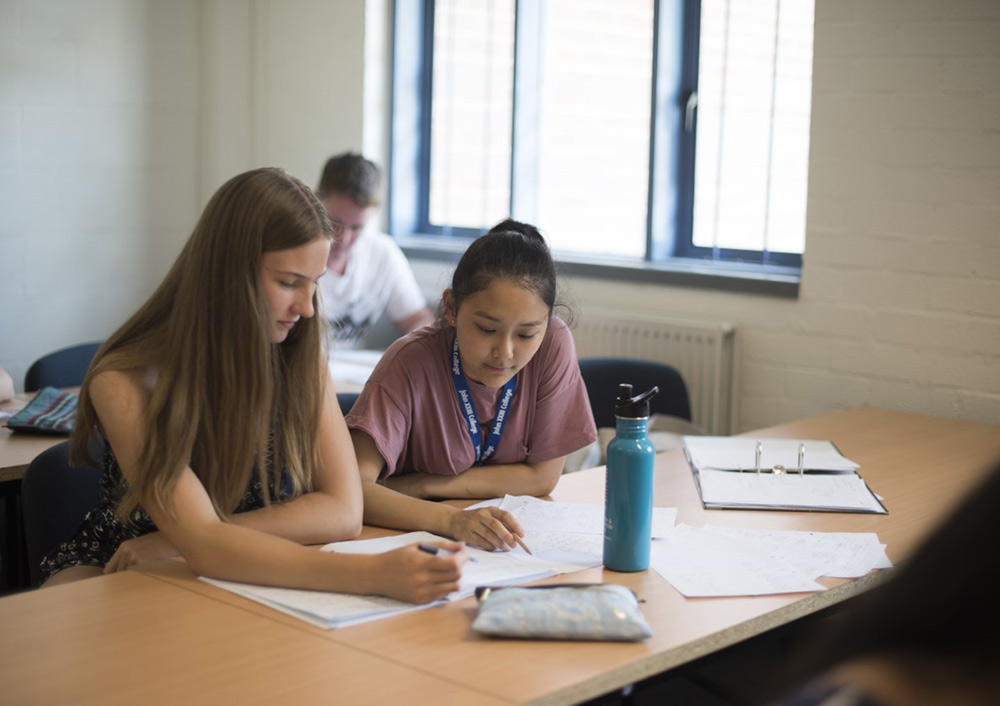
Scholarship recipients work together in groups at the NMSS 2019 (Courtesy: NMSS)
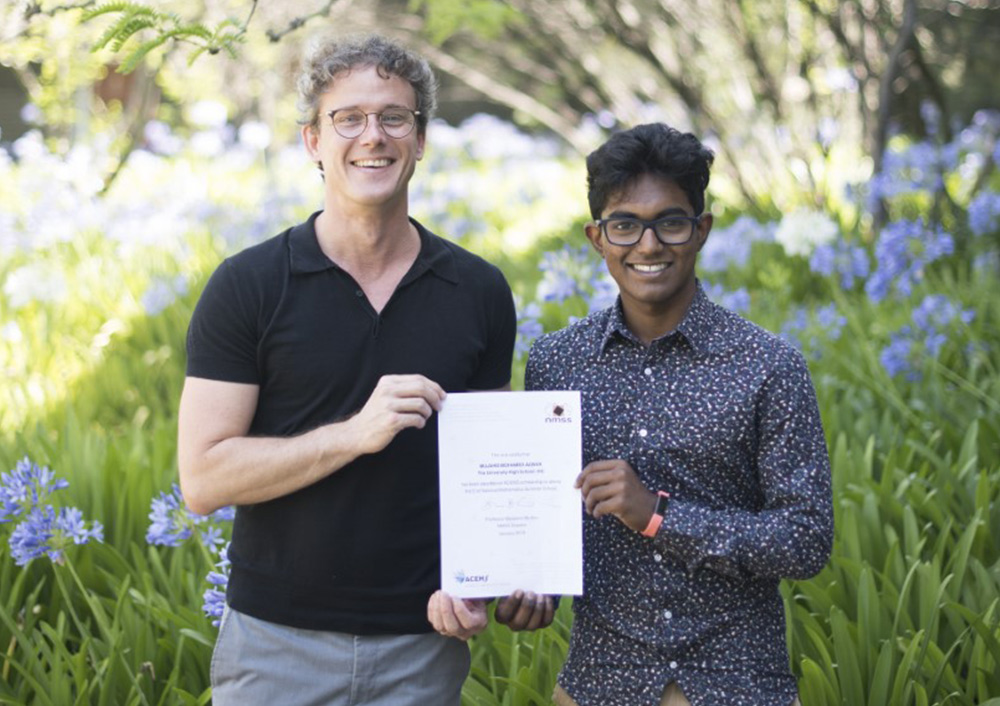
ACEMS scholarship recipient awarded by NMSS Director Professor Ben Burton (Courtesy: NMSS)
Young Statisticians Conference
1-2 October 2019, Canberra, Australia
This year’s Young Statisticians Conference was held in Canberra, at Manuka Oval, Canberra’s iconic cricket ground. It was preceded by two workshops targeted at the delegate demographic, and a Trivia Night which doubled as an ice breaker on the eve of the conference. The conference dinner activities on 1 October 2019, held at the Kingston Hotel, were designed to highlight the achievements of women in statistics.
The conference was attended by 90 delegates. The conference offered a diverse program organised into sessions with topics including mathematical statistics, biostatistics, population statistics, agricultural/ecological statistics, and data science.
ACEMS provided support for the YSC 2019 Conference Dinner. The dinner honored female statisticians with a female-focused Wiki-a-thon, based on the premise that male scientists are more likely to achieve public recognition through the creation of a Wikipedia page than female scientists. During the evening, the delegates created Wikipedia pages for 16 female statisticians of note who did not have Wikipedia pages. In addition, Professor Adrian Barnett led a ‘best freehand drawing of a normal distribution’ competition during the dinner. Delegates were highly engaged with these activities, and feedback was very positive.
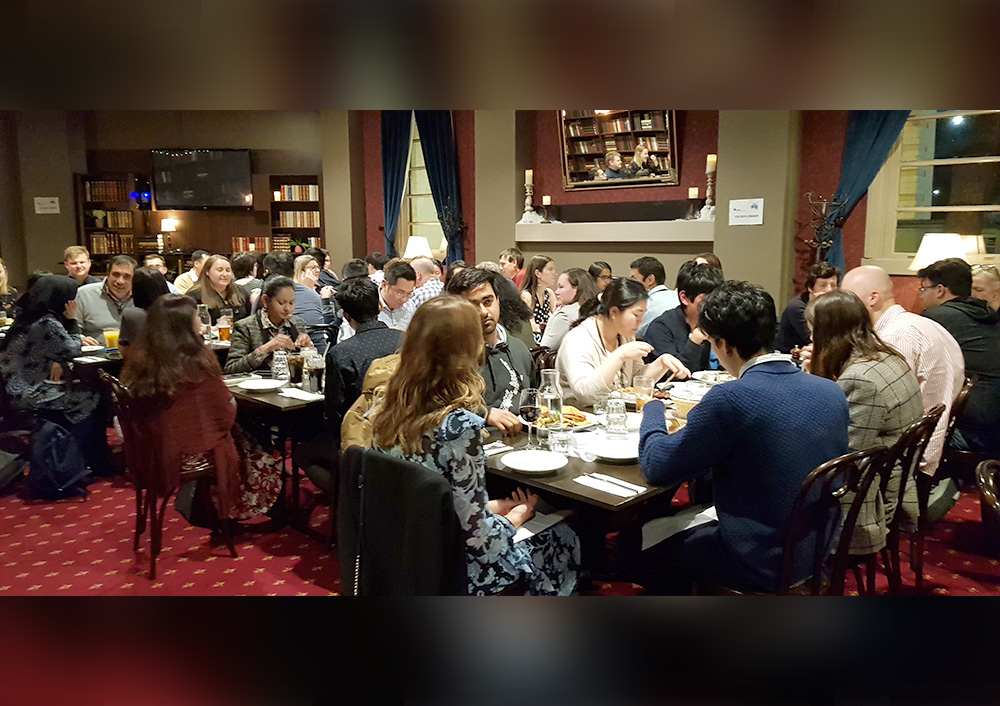
Conference Dinner held at the Kingston Hotel (Courtesy: YSC)
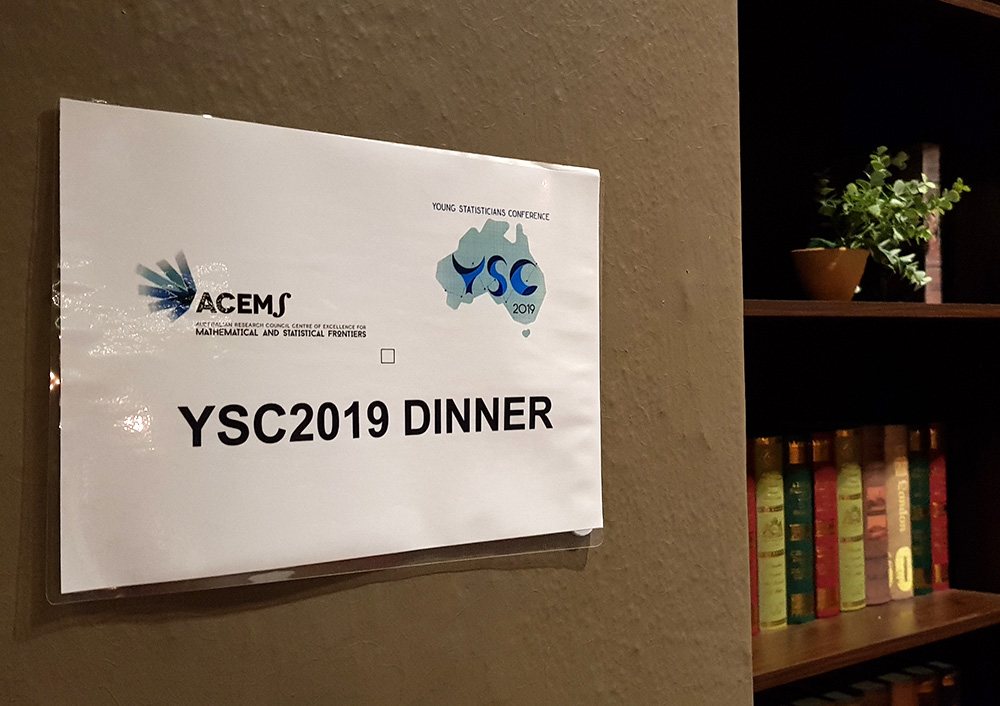
ACEMS was showcased as the dinner sponsor at YSC2019 (Courtesy: YSC)
ANZIAM Annual Conference
3-7 February 2019, Nelson, New Zealand
ACEMS was one of seven sponsors of the 55th ANZIAM Annual Conference held at the Rutherford Hotel in Nelson, New Zealand.
There was an excellent turnout from the applied mathematics community with 230 registrations. The conference program featured 214 talks altogether, made up of nine invited plenary talks and 205 contributed talks, of which 75 were from students. There were delegates from many countries including Japan, the US, the UK, Germany, Russia Canada and India.
The Women in Mathematical Sciences Lunch was held on Tuesday 5 February under the umbrella of the Women in Mathematics Special Interest Group (WIMSIG) of the Australian Mathematical Society and was open to all conference delegates. The purpose of the lunch is to support women, and particularly early career researchers, to enter and establish careers in mathematics.
Building on an initiative from the 2018 conference in Hobart, the event featured an informal LGBTI+ morning tea open to all. This allowed participants to discuss issues affecting LGBTI+ delegates, as well as broader issues of diversity at the conference.
ACEMS members awarded top honours at ANZIAM 2019 were:
- PhD Student Jesse Sharp from Queensland University of Technology was awarded the AF Pillow Applied Mathematics Top-Up Scholarship
- ACEMS Director Peter Taylor from The University of Melbourne was awarded the ANZIAM Medal
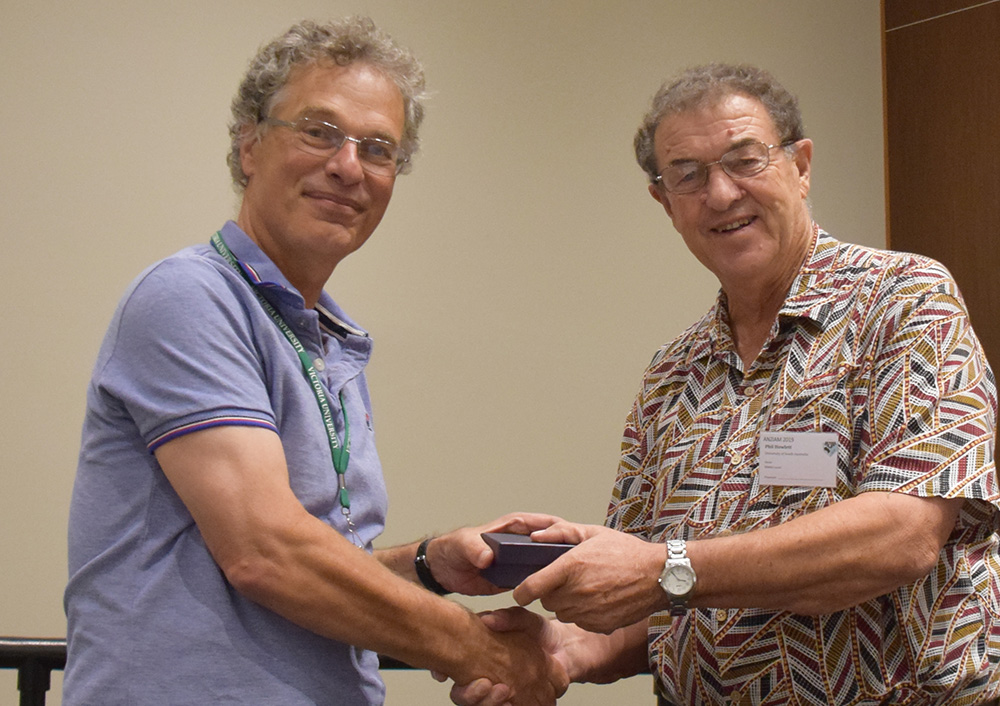
Professor Phil Howlett presenting Professor Peter Taylor with the ANZIAM Medal (Courtesy: ANZIAM)
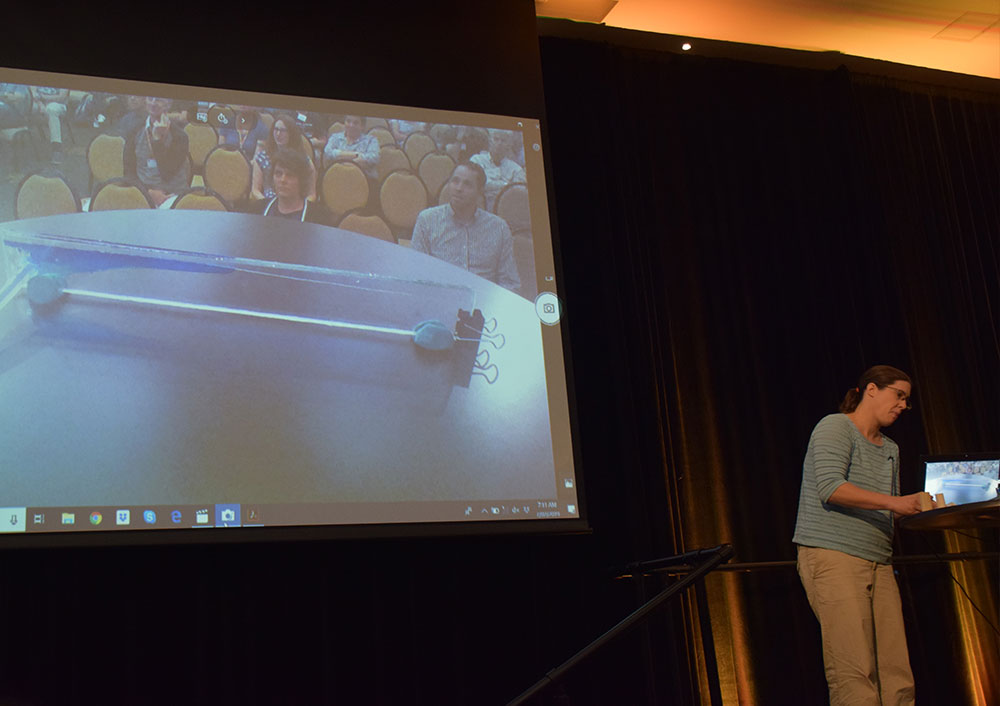
One of the highlights of the conference was a live demo of a Hele Shaw cell by invited speaker Anja Slim (Courtesy: ANZIAM)
Re:produce Workshop
10-11 December 2019, Brisbane, Australia
The Re:produce workshop was designed as an opportunity to empower the next generation of science leaders with the tools and considerations required to address these challenges and help them make their research more open and transparent. The two-day workshop was held at Customs House located beside the beautiful Brisbane river.
Over the two days, 60 early- and mid-career researchers (EMCRs) and PhD students from a range of disciplines across Australia engaged in sessions designed to explore reproducibility in every step of the research process. With ACEMS’ financial support, the conference organisers were able to further support diversity and inclusion at the event by offering mobility grants that facilitated the attendance of researchers: with caring responsibilities; with experience of living with disability; who currently live in regional and remote areas; and who identify as culturally and linguistically diverse.
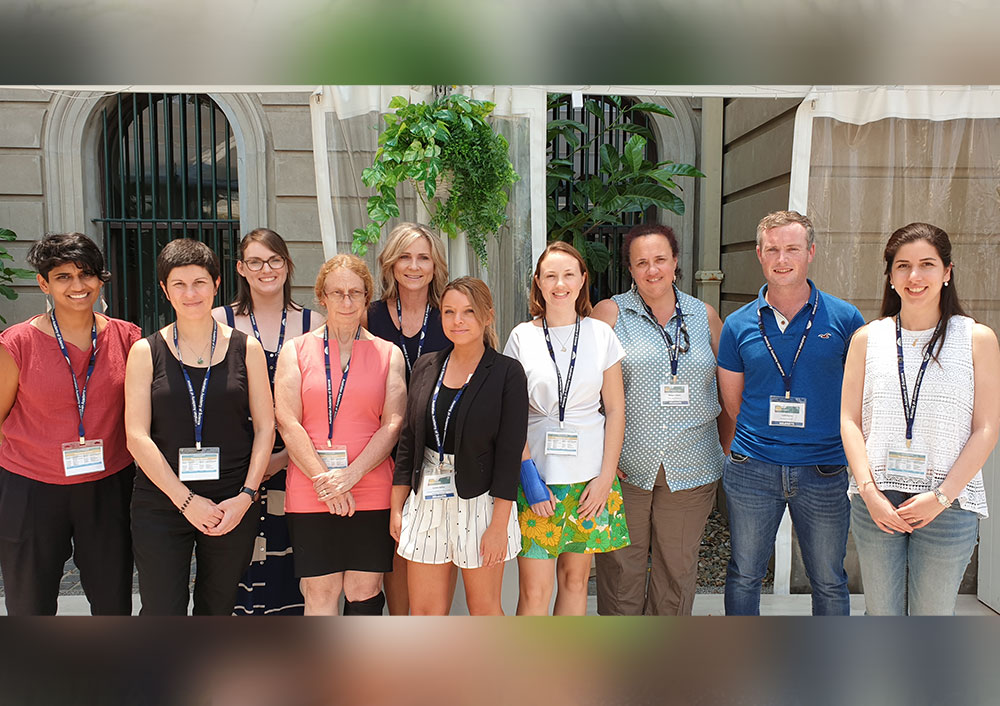
Re:produce workshop mobility grant recipients (Courtesy: Australian Academy of Science)
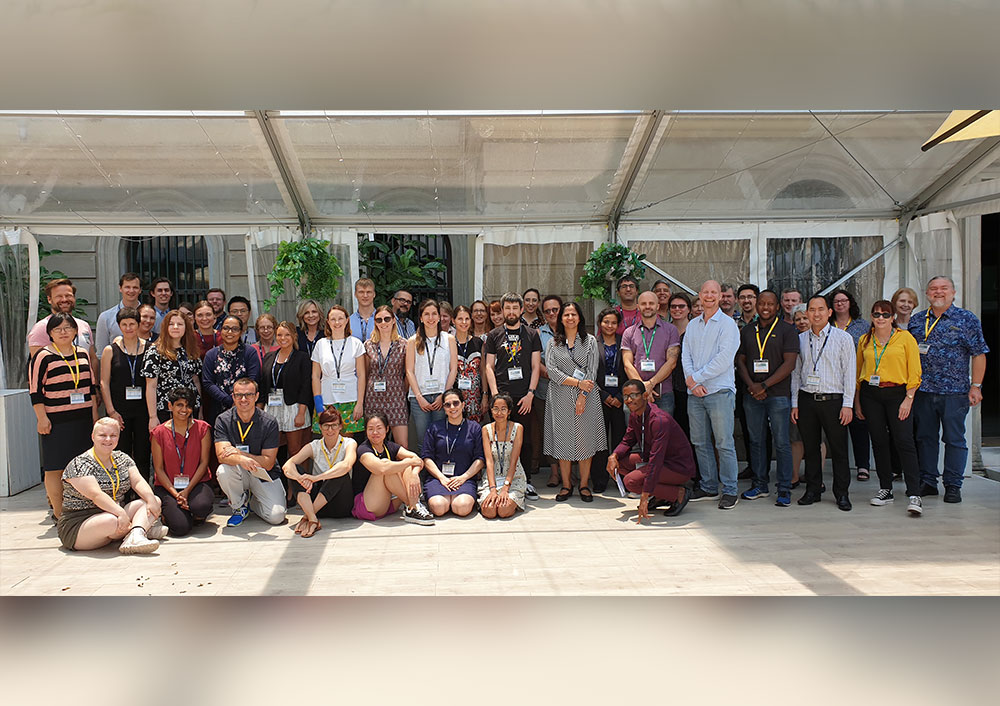
Re:produce workshop attendees (Courtesy: Australian Academy of Science)
63rd Annual Meeting of the Australian Mathematical Society
3-6 December 2019, Melbourne, Australia
The 63rd Annual Meeting of the Australian Mathematical Society was hosted at Monash University’s Clayton Campus.
On the evening prior (2 December) there was a dinner organised by WIMSIG, the Society’s Women in Mathematics Special Interest Group. ACEMS’ sponsorship was used to fund the dinner so that attendance was free to all registrants, and all were encouraged to attend. At the dinner, five women talked about their careers and the challenges they have faced (and overcome!).
The purpose of the event was to celebrate women's achievement and promote awareness of the obstacles that prevent greater participation of women in mathematics. The speakers were:
- Astrid an Huef (Victoria University of Wellington)
- Nalini Joshi (University of Sydney)
- Leanne Rylands (Western Sydney University)
- Joanna Sikora (ANU)
- Corinna Ulcigrai (University of Zurich)
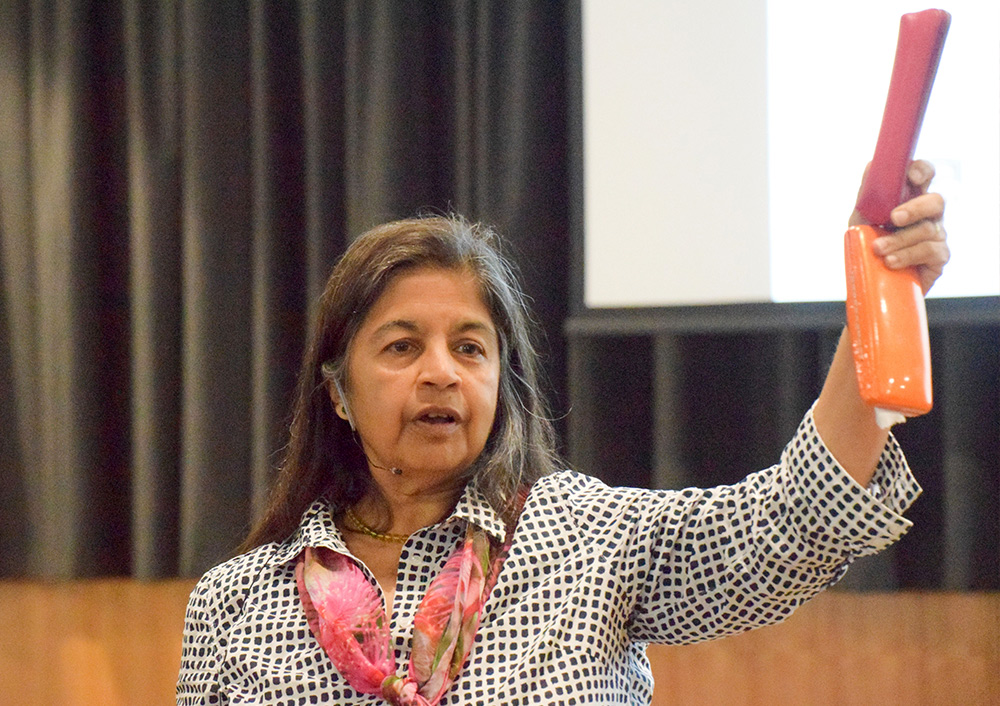
Invited speaker Nalini Joshi from University of Sydney (Courtesy: AustMS)
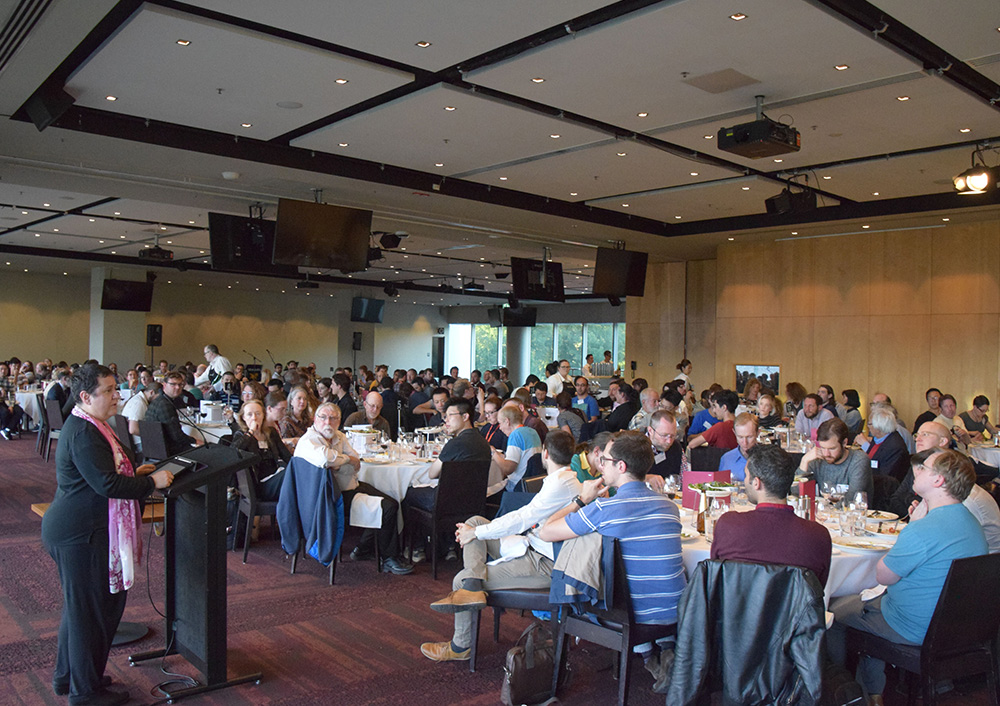
AustMS dinner on 2 December 2019 organised by WIMSIG (Courtesy: AustMS)
The 2nd Applied Statistics and Policy Analysis Conference (ASPAC2019)
5-6 September 2019, Wagga Wagga, Australia
ASPAC2019 was held at Charles Sturt University’s Convention Centre in Wagga Wagga.
The conference aimed to foster and promote international research collaborations and exchange ideas between data scientists, applied statisticians and data modelers who will detail the latest innovations in research to gather and disseminate information from small to big data settings, and from policy analysts who will describe how they use existing information from increasing big data environments and indicate areas in which there need to be methodological and technological developments. Another aim was to provide a forum for presenting current research work in the form of keynote, invited and contributed sessions and establish connections between researchers at tertiary institutions and working in industry in Australasia and beyond.
Nearly 60 participants from 16 countries took part in the conference which created an excellent discussion in the parallel sessions and provided great stimulus for future research.
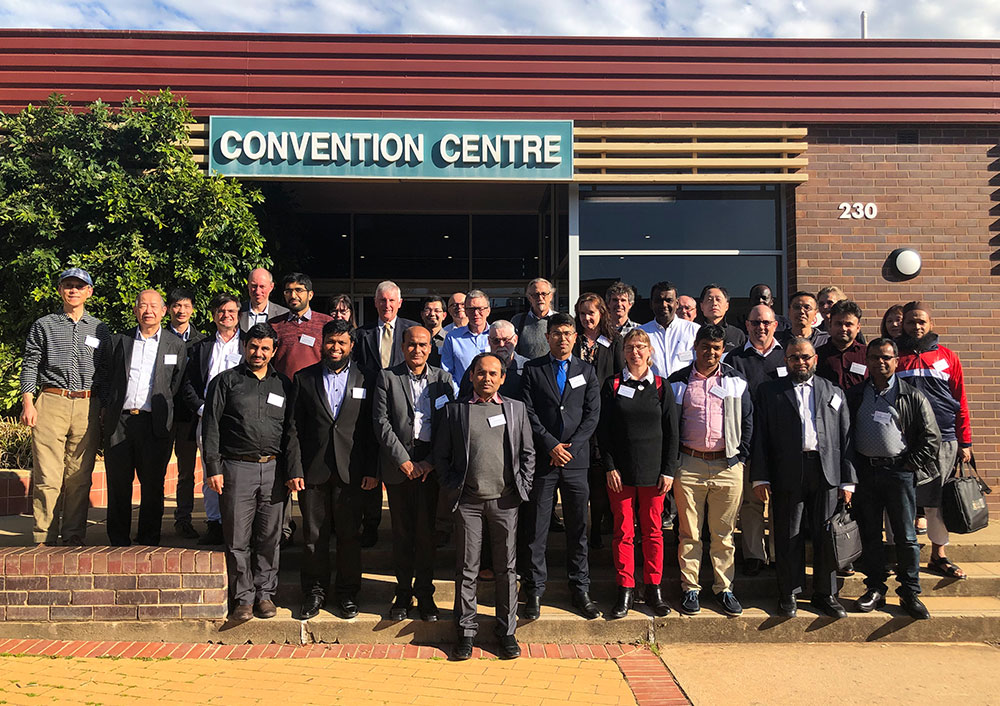
A subset of ASPAC2019 participants (Courtesy: ASPAC)
10th International Conference on Matrix-Analytic Methods in Stochastic Models (MAM10)
13-15 February 2019, Hobart, Australia
MAM10 was held in Hobart and attended by 45 participants from 22 institutions, including four Australian universities, 17 international universities from 13 countries, and Komatsu Ltd (Australia).
Matrix-Analytic Methods in Stochastic Models (MAM) conferences aim to bring together researchers working on the theoretical, algorithmic and methodological aspects of matrix-analytic methods in stochastic models and the applications of such mathematical research across a broad spectrum of fields, which includes computer science and engineering, telephony and communication networks, electrical and industrial engineering, operations research, management science, financial and risk analysis, bio-statistics, and evolution.
The MAM10 conference has provided a forum to present recent results in the matrix-analytic methods. The organisers opened this forum to the local community by giving an option of attending to selected talks without registration; several local students and academics took up this option.
ACEMS funded the main conference dinner and supported travel expenses for female invited speakers. A number of ACEMS students attended the conference presenting research talks and posters. ACEMS CI Professor Phil Pollett from The University of Queensland and ACEMS AI Dr Giang Nguyen from The University of Adelaide were two of the keynote speakers at the conference.
3rd Victorian Research Students' Meeting in Probability and Statistics
2 October 2019, Melbourne, Australia
The 3rd Victorian Research Students' Meeting in Probability and Statistics took place at The University of Melbourne. Altogether, 26 students attended, 14 of whom presented their work. Students were from The University of Melbourne, Monash University, Latrobe University, RMIT and Swinburne University.
Topics included random walks, limit theorems, statistical models, approximate Bayesian computation, and strategic queueing. The majority of the talks fell within the field of probability with the rest being multidisciplinary or statistics related.
ACEMS AI Dr Giang Nguyen from The University of Adelaide delivered the plenary presentation.
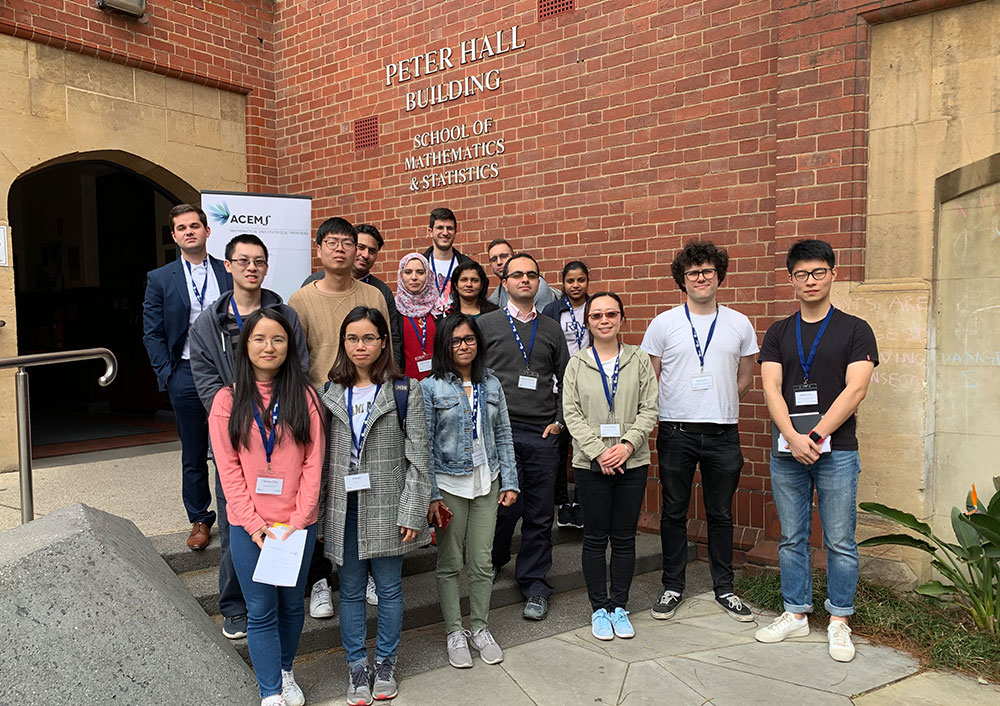
A subset of participants outside the Peter Hall Building, named after ACEMS’ Founding Director (Courtesy: VRSMiPS)
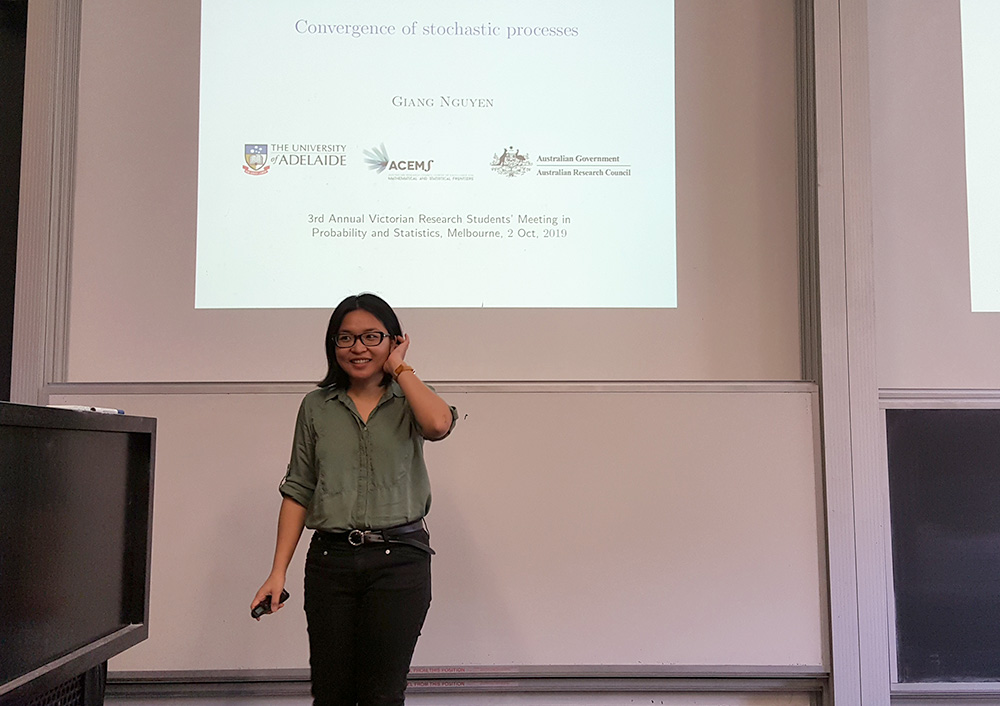
Dr Giang Nguyen delivered the plenary presentation (Courtesy: VRSMiPS)